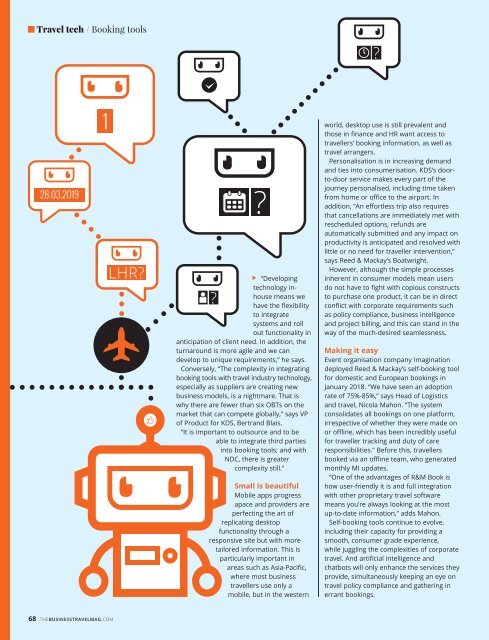Create successful ePaper yourself
Turn your PDF publications into a flip-book with our unique Google optimized e-Paper software.
<strong>Travel</strong> tech / Booking tools<br />
“Developing<br />
technology inhouse<br />
means we<br />
have the flexibility<br />
to integrate<br />
systems and roll<br />
out functionality in<br />
anticipation of client need. In addition, the<br />
turnaround is more agile and we can<br />
develop to unique requirements,” he says.<br />
Conversely, “<strong>The</strong> complexity in integrating<br />
booking tools with travel industry technology,<br />
especially as suppliers are creating new<br />
business models, is a nightmare. That is<br />
why there are fewer than six OBTs on the<br />
market that can compete globally,” says VP<br />
of Product for KDS, Bertrand Blais.<br />
“It is important to outsource and to be<br />
able to integrate third parties<br />
into booking tools; and with<br />
NDC, there is greater<br />
complexity still.”<br />
Small is beautiful<br />
Mobile apps progress<br />
apace and providers are<br />
perfecting the art of<br />
replicating desktop<br />
functionality through a<br />
responsive site but with more<br />
tailored information. This is<br />
particularly important in<br />
areas such as Asia-Pacific,<br />
where most business<br />
travellers use only a<br />
mobile, but in the western<br />
world, desktop use is still prevalent and<br />
those in finance and HR want access to<br />
travellers’ booking information, as well as<br />
travel arrangers.<br />
Personalisation is in increasing demand<br />
and ties into consumerisation. KDS’s doorto-door<br />
service makes every part of the<br />
journey personalised, including time taken<br />
from home or office to the airport. In<br />
addition, “An effortless trip also requires<br />
that cancellations are immediately met with<br />
rescheduled options, refunds are<br />
automatically submitted and any impact on<br />
productivity is anticipated and resolved with<br />
little or no need for traveller intervention,”<br />
says Reed & Mackay’s Boatwright.<br />
However, although the simple processes<br />
inherent in consumer models mean users<br />
do not have to fight with copious constructs<br />
to purchase one product, it can be in direct<br />
conflict with corporate requirements such<br />
as policy compliance, business intelligence<br />
and project billing, and this can stand in the<br />
way of the much-desired seamlessness.<br />
Making it easy<br />
Event organisation company Imagination<br />
deployed Reed & Mackay’s self-booking tool<br />
for domestic and European bookings in<br />
January 2018. “We have seen an adoption<br />
rate of 75%-85%,” says Head of Logistics<br />
and travel, Nicola Mahon. “<strong>The</strong> system<br />
consolidates all bookings on one platform,<br />
irrespective of whether they were made on<br />
or offline, which has been incredibly useful<br />
for traveller tracking and duty of care<br />
responsibilities.” Before this, travellers<br />
booked via an offline team, who generated<br />
monthly MI updates.<br />
“One of the advantages of R&M Book is<br />
how user-friendly it is and full integration<br />
with other proprietary travel software<br />
means you’re always looking at the most<br />
up-to-date information,” adds Mahon.<br />
Self-booking tools continue to evolve,<br />
including their capacity for providing a<br />
smooth, consumer grade experience,<br />
while juggling the complexities of corporate<br />
travel. And artificial intelligence and<br />
chatbots will only enhance the services they<br />
provide, simultaneously keeping an eye on<br />
travel policy compliance and gathering in<br />
errant bookings.<br />
68 THEBUSINESSTRAVELMAG.com

















